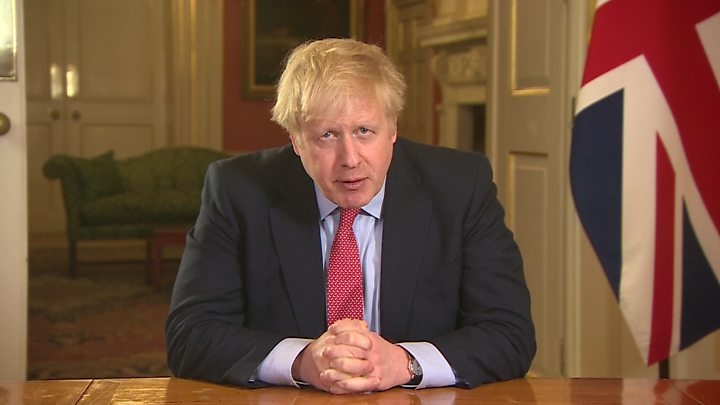Johnson announces strict new curbs on life in UK

Strict new curbs on life in the UK to tackle the spread of coronavirus have been announced by the prime minister.
People may only leave home to exercise once a day, to travel to and from work where "absolutely necessary", to shop for essential items, and to fulfil any medical or care needs.
Shops selling non-essential goods have been told to shut and gatherings in public of more than two people who do not live together will be prohibited.
The UK death toll has reached 335.
If people do not follow the rules police will have the powers to enforce them, including through fines and dispersing gatherings, Prime Minister Boris Johnson said in a televised statement from Downing Street.
Mr Johnson said the country faced a "moment of national emergency" and staying at home was necessary to protect the NHS and save lives.
He said the restrictions would be in place for at least three weeks and would be kept under constant review.
The government guidance says people should only leave home for one of four reasons:
Shopping for basic necessities such as food and medicine. Shopping trips should be as infrequent as possible
One form of exercise a day such as a run, walk, or cycle. This should be done alone or only with people you live with
Any medical need, or to provide care or to help a vulnerable person. This includes moving children under the age of 18 between their parents' homes, where applicable. Key workers or those with children identified as vulnerable can continue to take their children to school
Travelling to and from work, but only where work absolutely cannot be done from home
Even when following the above guidance, people should minimise the amount of time spent out of their homes and should keep two metres (6ft) away from people they do not live with.
The government is also stopping all social events, including weddings, baptisms and other ceremonies - but funerals will be allowed.
Businesses that will not need to close include:
- Restaurants, cafes and work canteens - but only for food delivery and takeaway services
- Supermarkets and other premises selling food, including market stalls
- "Health shops" such as pharmacies
- Petrol stations, garages and car rental businesses
- Bicycle shops
- Home and hardware shops
- Launderettes and dry cleaners
- Pet shops
- Corner shops, newsagents and post offices
- Banks
Other premises including libraries, non-essential shops, playgrounds, outdoor gyms and places of worship have been ordered to close.
Parks will remain open for exercise but people are not allowed to gather in groups.
Community centres can remain open but only for the purpose of "hosting essential voluntary or public services" such as food banks or service for homeless people, the guidance says.
Hotels, hostels, campsites and caravan parks must also close unless key workers need to stay there, or if other people staying there cannot return to their primary residence.
Scientists have said each person with coronavirus infects 2.5 people and that takes about five days. This means, over a period of 30 days, more than 400 people will have been infected as a result of that one person.
If a person halves their social exposure, that first infection leads to only 15 infections after 30 days.
'Real challenge'
Several police forces said they were facing a high number of phone calls from members of the public seeking clarification on the new restrictions.
Northamptonshire Police Chief Constable Nick Adderley warned the public not to "cripple" his force's phone lines.
Martin Hewitt, chair of the National Police Chiefs' Council, said they were working with the government and other agencies to work out how best to enforce the new rules.
But Ken Marsh, chairman of the Metropolitan Police Federation, said he was already seeing "large amounts of sickness" among officers across London and enforcing the new restrictions would be "a real, real challenge".
"We will be dealing with it, but I'm not sure we will have the resources to be able to see it through," he added.
Home Secretary Priti Patel said in a tweet that the next few weeks would be "testing" for police but that she would make sure officers had "the resources they need to keep themselves and the public safe".
Scotland's First Minister Nicola Sturgeon said the new restrictions "amount to a lockdown" and are "not done lightly".
"I am not going to sugarcoat it in any way," she said. "Coronavirus is the biggest challenge of our lifetime."
In a tweet, First Minister of Northern Ireland Arlene Foster urged people to follow the restrictions "to save lives and protect our hospitals".
First Minister of Wales Mark Drakeford said "these are really big changes for us all".
"We are making them because of the speed the virus is continuing to spread," he added.
Labour leader Jeremy Corbyn said the measures were "the right response".
"The government must close the loopholes to give security to all workers, including the self-employed, as well as renters and mortgage holders," he added.
The prime minister said the measures were necessary to tackle "the biggest threat this country has faced for decades".
"Without a huge national effort to halt the growth of this virus, there will come a moment when no health service in the world could possibly cope; because there won't be enough ventilators, enough intensive care beds, enough doctors and nurses," he said.
"And as we have seen elsewhere, in other countries that also have fantastic health care systems, that is the moment of real danger.
"To put it simply, if too many people become seriously unwell at one time, the NHS will be unable to handle it - meaning more people are likely to die, not just from coronavirus but from other illnesses as well.
